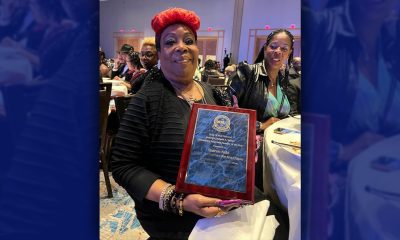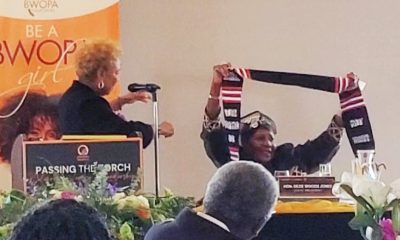City Government
Mayor, OPD Face Questions on Continued Racial Profiling

Deputy Chief Leronne Armstrong
Mayor Libby Schaaf’s administration and the Oakland Police Department are facing questions about whether they have a serious plan to end racial profiling by police of African-American residents, who make up the overwhelming majority of local residents stopped by OPD for no reason at all.
The issue came up sharply at the City Council’s Public Safety Committee meeting last week when Deputy Police Chief LeRonne Armstrong—speaking for OPD—addressed the public’s concerns about the persistence of the high percentage of Africans who are racially profiled by the police.
“When you practice precision-based or intelligence-based policing, you have to focus in on those who are committing crimes,” he said. “The disparity exists based on who commits crimes in this city.”
In response, Councilmember-at-Large Rebecca Kaplan sent a tweet last Tuesday calling for the administration and OPD to retract the comment:
“This comment is offensive and untrue—and OPD leadership and (the) Oakland administration should formally retract this claim. Black people are being pulled over, searched and even arrested, when there is no crime and no cause for suspicion,” said Kaplan.
Deputy Chief Armstrong clarified his comment in an interview with the Oakland Post:
“I think some people took the comment out of context. I apologize that the community has had to endure a comment that was taken in that way,” he said, pointing out that he is from the community and has had to experience unfair policing practices while growing up.
Continuing, he said, “The chief and I have been very committed to doing everything we can to reduce these disparity numbers. We are making far fewer stops than we were making even a year ago.”
“We are not satisfied with the disparity numbers,” he said, adding that the department is holding more training for officers on diversity and around procedural justice. He said people are stopped for something they do, not because of their race.
It is important for officers to explain to people the reason they were stopped, so they will know that “it was not racial but some behavior that occurred,” which caused the stop, he said.
Mayor Schaaf did not respond to the Oakland Post’s questions. However, her office said she “addressed the issue directly at a Public Safety Town Hall… last Thurday.” The event had not yet been posted by OPD by the Post’s deadline.
In an interview with the Post, Councilmember Kaplan raised concerns about the Schaaf administration’s reliance on the work of Stanford consultant Jennifer Eberhardt to end racial profiling by OPD.
“They are still disproportionately pulling over and questioning Black people, not based on the possibility of a particular crime being committed,” she said. “It is time to demand an end to suspicionless stops.”
The trends indicate that fewer people are being stopped by the police, but African Americans are still stopped the most.
Police non-traffic stops have fallen between December 2016 and November 2017 from 14,259 to 11,219, a 21 percent decrease.
“Very little progress has been made as the share of Africans (in non-traffic) stops (has increased) slightly from 66 percent to 68 percent” of total stops, according to a PowerPoint presentation presented to OPD in February 2018 by the Stanford Technical Assistance Team.
(See http://www2.oaklandnet.com/oakca1/groups/police/documents/webcontent/oak069090.pdf)
In the six months between June-November 2017, 5,259 African Americans were stopped by police—1,161 less than the previous six months.
According to the researchers’ PowerPoint, “Reducing disparities in policing outcomes is notoriously difficult because they are multiply determined, including by sociological factors outside of the police’s control. But changing policies to reduce (total numbers) can make an immediate difference in terms of impact on populations of color.”
The City Council voted this week to extend Eberhardt’s contract over the objections of the Public Safety Committee, which wanted to look into what the city is going to do to end racial profiling before approving the $500,000, two-year agreement.
“There’s no explanation at all of what this contract is supposed to be doing,” said Kaplan. “We’ve had the contract for four years. Why is it not working?”
At last week’s Public Safety Committee meeting, Couincilmembers Desley Brooks and Noel Gallo questioned approving a contract without a full discussion.
“People who appear to have done nothing (illegal) have been stopped by police because of their race. That is not acceptable. And the mayor should not think that it’s acceptable,” said Councilmember Brooks.
“Why doesn’t the mayor want to address the issue? Asked Brooks. “She said she is concerned, and this is important work, but she isn’t interested” in discussing the substantive issues.
Mayor Schaaf released a statement to the media late Wednesday afternoon thanking the City Council for renewing the consultant’s contract.
“Dr. Eberhardt’s intensive and transparent research will continue to advance policies that change the impact of policing communities of color,” she said.
“Dr. Eberhardt’s work has helped OPD dramatically reduce the number of stops of African Americans, which contributes to improved police-community trust.”
Activism
Oakland Post: Week of December 31, 2025 – January 6, 2026
The printed Weekly Edition of the Oakland Post: Week of – December 31, 2025 – January 6, 2026

To enlarge your view of this issue, use the slider, magnifying glass icon or full page icon in the lower right corner of the browser window.
Activism
Oakland Post: Week of December 24 – 30, 2025
The printed Weekly Edition of the Oakland Post: Week of – December 24 – 30, 2025

To enlarge your view of this issue, use the slider, magnifying glass icon or full page icon in the lower right corner of the browser window.
Alameda County
Oakland Council Expands Citywide Security Cameras Despite Major Opposition
In a 7-1 vote in favor of the contract, with only District 3 Councilmember Carroll Fife voting no, the Council agreed to maintain its existing network of 291 cameras and add 40 new “pan-tilt-zoom cameras.”

By Post Staff
The Oakland City Council this week approved a $2.25 million contract with Flock Safety for a mass surveillance network of hundreds of security cameras to track vehicles in the city.
In a 7-1 vote in favor of the contract, with only District 3 Councilmember Carroll Fife voting no, the Council agreed to maintain its existing network of 291 cameras and add 40 new “pan-tilt-zoom cameras.”
In recent weeks hundreds of local residents have spoken against the camera system, raising concerns that data will be shared with immigration authorities and other federal agencies at a time when mass surveillance is growing across the country with little regard for individual rights.
The Flock network, supported by the Oakland Police Department, has the backing of residents and councilmembers who see it as an important tool to protect public safety.
“This system makes the Department more efficient as it allows for information related to disruptive/violent criminal activities to be captured … and allows for precise and focused enforcement,” OPD wrote in its proposal to City Council.
According to OPD, police made 232 arrests using data from Flock cameras between July 2024 and November of this year.
Based on the data, police say they recovered 68 guns, and utilizing the countywide system, they have found 1,100 stolen vehicles.
However, Flock’s cameras cast a wide net. The company’s cameras in Oakland last month captured license plate numbers and other information from about 1.4 million vehicles.
Speaking at Tuesday’s Council meeting, Fife was critical of her colleagues for signing a contract with a company that has been in the national spotlight for sharing data with federal agencies.
Flock’s cameras – which are automated license plate readers – have been used in tracking people who have had abortions, monitoring protesters, and aiding in deportation roundups.
“I don’t know how we get up and have several press conferences talking about how we are supportive of a sanctuary city status but then use a vendor that has been shown to have a direct relationship with (the U.S.) Border Control,” she said. “It doesn’t make sense to me.”
Several councilmembers who voted in favor of the contract said they supported the deal as long as some safeguards were written into the Council’s resolution.
“We’re not aiming for perfection,” said District 1 Councilmember Zac Unger. “This is not Orwellian facial recognition technology — that’s prohibited in Oakland. The road forward here is to add as many amendments as we can.”
Amendments passed by the Council prohibit OPD from sharing camera data with any other agencies for the purpose of “criminalizing reproductive or gender affirming healthcare” or for federal immigration enforcement. California state law also prohibits the sharing of license plate reader data with the federal government, and because Oakland’s sanctuary city status, OPD is not allowed to cooperate with immigration authorities.
A former member of Oakland’s Privacy Advisory Commission has sued OPD, alleging that it has violated its own rules around data sharing.
So far, OPD has shared Flock data with 50 other law enforcement agencies.
-

 Activism4 weeks ago
Activism4 weeks agoDesmond Gumbs — Visionary Founder, Mentor, and Builder of Opportunity
-

 Activism4 weeks ago
Activism4 weeks agoFamilies Across the U.S. Are Facing an ‘Affordability Crisis,’ Says United Way Bay Area
-

 Alameda County4 weeks ago
Alameda County4 weeks agoOakland Council Expands Citywide Security Cameras Despite Major Opposition
-

 Alameda County4 weeks ago
Alameda County4 weeks agoBling It On: Holiday Lights Brighten Dark Nights All Around the Bay
-

 Activism4 weeks ago
Activism4 weeks agoBlack Arts Movement Business District Named New Cultural District in California
-

 Activism4 weeks ago
Activism4 weeks agoLu Lu’s House is Not Just Toying Around with the Community
-

 Activism4 weeks ago
Activism4 weeks agoOakland Post: Week of December 17 – 23, 2025
-

 Activism3 weeks ago
Activism3 weeks agoFirst 5 Alameda County Distributes Over $8 Million in First Wave of Critical Relief Funds for Historically Underpaid Caregivers



















































